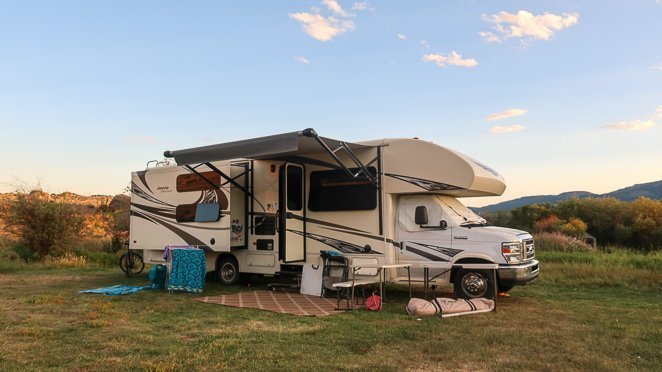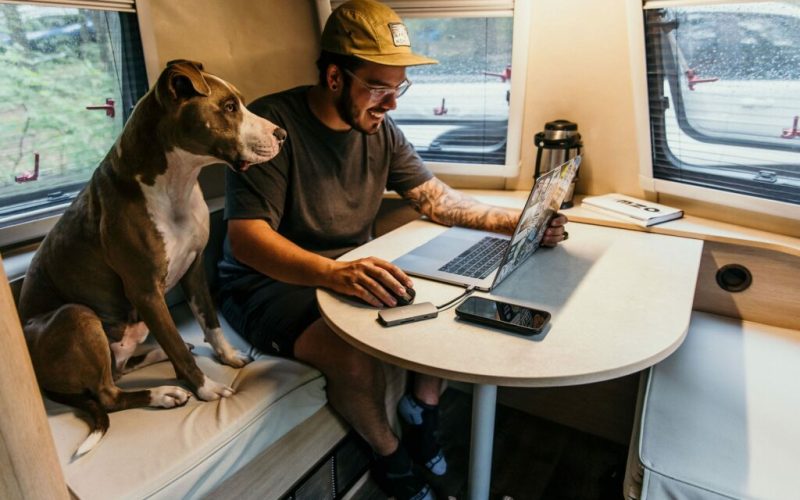
Is Full-Time RVing Right for You?
The change to full-time RV living is not to be taken lightly. There’s a lot that goes into switching from living in 123 White Picket Fence Lane, to on the road. But before you even think about the minutiae of what you’ll need to make that switch (from selling your house, figuring out work, school, etc) you have to ask yourself; Is this really what’s right for me?
First: What is prompting this change?
It’s important to examine the ‘why’ of your decisions carefully, because as cheesy as it sounds, making massive decisions like this don’t always come from a healthy place. And for your health, safety, and that of your loved ones, acknowledging the ‘why’ of a change is monumental. Doing it for the wrong reason can end badly.
Start with a few simple questions:
- What, if anything, are you running away from with this decision?
- Do you believe switching to an RV lifestyle will help you escape something?
- What are the positive changes you are expecting from this change that you aren’t currently experiencing?
- Do you feel like it will be an easy change to adjust to, or will it take a huge amount of adaptation that doesn’t come naturally?
The hope is that these questions will help you understand your motivations before moving forward.

The Hard Conversations
Once you’ve worked through those questions on your own the other hard conversations have to happen. And I’m not going to lie, going to your loved ones and telling them you want to pack up and move into an RV is going to have some people questioning your sanity.
But seriously, discuss this with your immediate family first, whether this is your spouse or significant other, kids, friends who might as well be family. Especially if you have kids, it’s not just your life you’re completely changing, it’s theirs (and you should really look at some of the videos and studies done on the hazards of full-time on the road living with kids. It’s not flattering for those parents).
So sit the kids down and seriously ask them:
- How do you feel about not seeing your friends for several months?
- Will not going to school in person bother you?
- How do you feel about leaving behind your sports team/club/etc?
Not taking how your kids feel about a possible change can quickly foster resentment, anger, and mental health and developmental issues. And in that case, it may be better to hold off on such a change until they are either a) comfortable with it, or b) moved out/not dependent upon you for room and board.
Otherwise, in order of importance, conversations about your choice to become a full-time RVer should be:
- Immediate family
- Friends
- Work
Which brings us to the next point: Expenses and Income
These are the do or die for your full timing dreams. If you don’t have a solid plan for your expenses and working on the road, you’re dead in the water. It’s going to look different for everyone, so have a clear expectation of what your expenses will be and what work will look like.

Downsizing
Once you’ve had the hard conversations and you’ve figured out just what your plan is, it’s time to deal with the first true step in making your dream a reality: getting rid of all your stuff.
It is a truth universally acknowledged that an RVer in possession of a lot of crap must be in want of Marie Kondo.
Look, whether you want to be scientific about the properties of matter or you just binge watch a lot of Hoarders, you know that you can’t fit everything you own in even the largest RV model. So first, you’ve got to slim down on everything.
And no, it’s not too early. In fact, as soon as you’ve decided that yes, you’re doing this – you need to start this process. It is going to be a bigger deal than you expect, because it’s not just getting rid of a bunch of stuff, it’s getting rid of most of your stuff – and there’s emotions that go along with that (it’s okay, we all put a bit of meaning behind seemingly innocuous items, even if we refuse to admit it).
People go about this in a lot of different ways, but one way we found in our research (thanks Trekkn for the referral) is courtesy of The Minimalists with their 30 Day Minimalism Game.
The concept: For 30 days you increase the number of items you get rid of, until by the end you have gotten rid of 465 items! So that’s 1 for Day 1, 2 for Day 2, 20 for Day 20, etc.
A couple other tips for decluttering:
- The 80/20 Rule: Studies show we only use 20% of our stuff, 80% of the time. So do you really need 6 pairs of jeans, or can you get by with 2?
- No more “just in case” items. Have a solid plan for everything you keep and how it will be used, not how it could be.
- Start small and work your way up. Don’t immediately jump into the storage room and childhood memories, begin with the coat closet or junk drawer and move up to the bigger tasks.
If full-time RVing works for your lifestyle it can be an incredible way to change how you live your life. It gives you the freedom to pick up your roots and carry them wherever you wish, seeing so much more than you normally could. But if we can leave you with a final thought: do not make the decision rashly before heading down the path.
